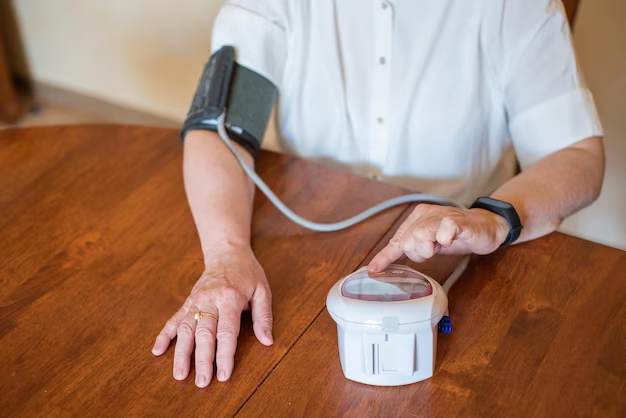Understanding Hypertension: Is It Simply High Blood Pressure?
When many people hear the term "hypertension," they immediately think of high blood pressure. But is that all there is to it? The answer involves a blend of definitions, exploration of causes, potential impacts on health, and insight into prevention and management options that can empower us to lead healthier lives.
What is Hypertension?
Hypertension, commonly known as high blood pressure, occurs when the force of your blood against your arterial walls is persistently too high. This condition is often dubbed "the silent killer" because it rarely exhibits symptoms until significant damage is done.
How is Blood Pressure Measured?
Blood pressure is evaluated using two numbers: systolic and diastolic. The systolic number (the top, higher number) represents the pressure in your arteries when your heart beats. The diastolic number (the bottom, lower number) indicates the pressure in your arteries between beats. Normal blood pressure typically reads as 120/80 mm Hg.
Major Factors Contributing to Hypertension
While hypertension can affect anyone, several contributing factors increase the risk of developing the condition:
Lifestyle Choices
- Diet: A diet high in salt, fats, and cholesterol can elevate blood pressure.
- Sedentary Lifestyle: Lack of physical activity increases the risk of hypertension and contributes to weight gain, which strains the heart.
- Smoking and Alcohol Consumption: Both habits can raise blood pressure, leading to hardening of the arteries.
Genetic and Medical Factors
- Family History: If hypertension runs in your family, you might be at higher risk.
- Age and Gender: While younger men are more prone to hypertension, women often face higher risks post-menopause.
- Underlying Health Conditions: Conditions like kidney disease and diabetes can also contribute to hypertension.
The Impact of Hypertension on Health
The effects of uncontrolled hypertension extend beyond elevated blood pressure. It can lead to severe complications if left untreated:
Cardiovascular Diseases
Persistent high blood pressure can damage arteries, leading to heart attacks or strokes. It can also cause heart failure due to the increased strain on the heart.
Organ Damage
Hypertension can lead to chronic kidney disease and might impair other organs as blood flow becomes more restricted.
Eye Damage
In some cases, hypertension can lead to problems with vision or conditions like hypertensive retinopathy due to damage to the blood vessels in the eyes.
Early Detection and Monitoring
Since hypertension rarely shows symptoms, early detection through regular monitoring is crucial.
Regular Check-Ups
Seeing a healthcare provider for regular check-ups can help track blood pressure health and detect any anomalies early.
Home Monitoring
Consider using a blood pressure monitor at home to keep daily track, particularly important if you have been diagnosed with, or are at risk of, hypertension.
Lifestyle Changes to Manage Hypertension
Not all hope is lost if you are diagnosed with hypertension. Small, consistent lifestyle changes can significantly improve your health:
Dietary Adjustments
- Adopt the DASH Diet: This diet emphasizes fruits, vegetables, whole grains, and low-fat dairy. It particularly stresses reducing sodium intake.
- Limit Alcohol and Caffeine: Cutting back these stimulants can help control blood pressure numbers.
Increase Physical Activity
Physical activities such as walking, cycling, or swimming for at least 150 minutes a week can assist in lowering blood pressure.
Stress Management
Activities like yoga, meditation, or deep-breathing exercises can significantly reduce chronic stress, subsequently aiding in lowering blood pressure.
Medical Interventions for Hypertension
In some cases, lifestyle modifications alone may not suffice, and medications become necessary to manage hypertension effectively.
Types of Medications
- Diuretics: Help get rid of excess sodium and water from the body.
- Beta-blockers: Reduce heart rate and the heart’s output of blood.
- ACE Inhibitors: Help relax blood vessels.
Regular Consultation with Healthcare Providers
Relating closely with healthcare professionals ensures that medication plans are appropriately tailored, and necessary adjustments can be made promptly.
Is Hypertension Reversible?
For some, hypertension can be effectively managed and even reversed by combining medication and lifestyle changes. However, the emphasis remains on early detection and timely intervention.
Understanding Blood Pressure Readings
Getting a reading of your blood pressure can sometimes be confusing. Here’s a quick understanding:
- Normal: Less than 120/80 mm Hg
- Elevated: 120-129/<80 mm Hg
- Hypertension Stage 1: 130-139 or 80-89 mm Hg
- Hypertension Stage 2: 140+ or 90+ mm Hg
- Hypertensive Crisis: Over 180/120 mm Hg – Requires immediate medical attention
Embracing a Heart-Healthy Lifestyle
Adopting a heart-healthy lifestyle benefits everyone, not just those with hypertension. Here are practical steps:
Build a Support System
Having a circle of friends or family members who motivate and hold you accountable for your health journey helps tremendously.
Stay Informed
Keeping up with the latest information on hypertension and engaging with community or educational resources can be empowering.
Make Gradual Changes
Implement lifestyle changes gradually; the key is to sustain these changes for the long haul.
Engaging in regular health assessments paired with positive lifestyle changes can combat the adverse effects of hypertension, offering a path towards healthier, longer lives.
Quick Takeaways for Maintaining Healthy Blood Pressure 🌟
- 🤸♂️ Stay Active: Engage in 150 minutes of physical activity weekly.
- 🥗 Follow the DASH Diet: Focus on fruits, veggies, whole grains, and cut down on sodium.
- ⏰ Regular Monitoring: Check blood pressure regularly both at home and with healthcare providers.
- 🧘♀️ Manage Stress: Incorporate stress-reducing practices like yoga or meditation.
- 🚭 Quit Smoking & Limit Alcohol: Refrain from smoking and keep alcohol intake minimal.
- 👥 Build a Support Network: Create a community of support to stay motivated.
These steps can help guide you toward managing and understanding hypertension effectively, cultivating a healthier lifestyle in the process.

Related Articles
- Are Eggs Bad For Hypertension
- Are Endocrine Disorders Causing Hypertension Rare
- Can Alcohol Cause Hypertension
- Can Allergies Cause Hypertension
- Can Anemci People Get Hypertension
- Can Anemia Cause Hypertension
- Can Antibiotics Cause Hypertension
- Can Anxiety Cause Hypertension
- Can Asthma Cause Hypertension
- Can Atherosclerosis Cause Hypertension
